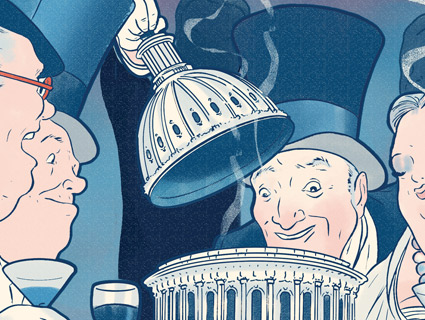Since the election of Barack Obama, right-wingers like Glenn Beck have made a concerted effort to craft a narrative in which whites are the new oppressed and reverse-racism, rather than actual racism, is the new great challenge of our times. CNN captured the zeitgeist last month, when it headlined a story, “Are whites racially oppressed?” (the actual article was far less hysterical).
Charles Murray, the libertarian scholar most famous for his book The Bell Curve, thankfully, did not go down that path in his “State of White America” address to the American Enterprise Institute last night. Instead, he focused on a set of social trends he believes “will end what has made America, America.” Specifically, an ever-widening gap between what he calls “the new lower class” and “the new elite,” which he attributes to the slow creep of the European-style welfare state.
He’s offered a glimpse of this before, but he expanded on it at AEI: Essentially, he says, the four virtues that hold the key to American Exceptionalism—marriage, religiosity, work ethic, and honesty—are in steady decline among the white lower class, with destructive consequences. It’s an age-old problem: the government gives you food stamps, and the next thing you know, your marriage has collapsed, you’ve quite your job, you’ve turned your back to God, and you’re facing 5 to 10 for holding up a Piggly Wiggly.
“The parallel that keeps nagging at me is Rome,” he explained, comparing the nation’s current precipice to the classical civilization’s conversion from a republic to an empire. We’re not going to collapse, he says, but society will become a lot more stratified.
What Murray ignores are the political forces that makes it possible for issues facing poor whites to be kept so muffled. To that end, the night’s most revealing moment came when Murray discussed the tea party. Coming to the defense of the conservative political movement, Murray began to read off a list of agenda items he said he’d found at “the tea party’s website.” There is no tea party website (he was quoting the Tea Party Patriots); just a lot of different, often feuding groups vying for the attention. But, when coupled with his assertion that the movement was a “spontaneous” and “grassroots” effort, you can start to see where he goes so wildly astray: Murray’s totally blind to the corporatism that drives Republican (and increasingly Democratic) politics—and its effect on growing income inequality (now available in chart form).
In other words, the greatest problem facing the new white lower class (such as it is) probably isn’t that poor whites are coasting along on government handouts; quite the opposite. Their main party has embraced a corporate philosophy that says that the freedom to fail is what makes America great, that people who receive government assistance are akin to stray dogs, and that having an “adult conversation” means cutting capital gains tax rates in a recession while slashing funding for programs that might help poor people. Murray’s right to call attention to problems facing the white working class. But he doesn’t need to look far to figure out why nothing’s being done.












